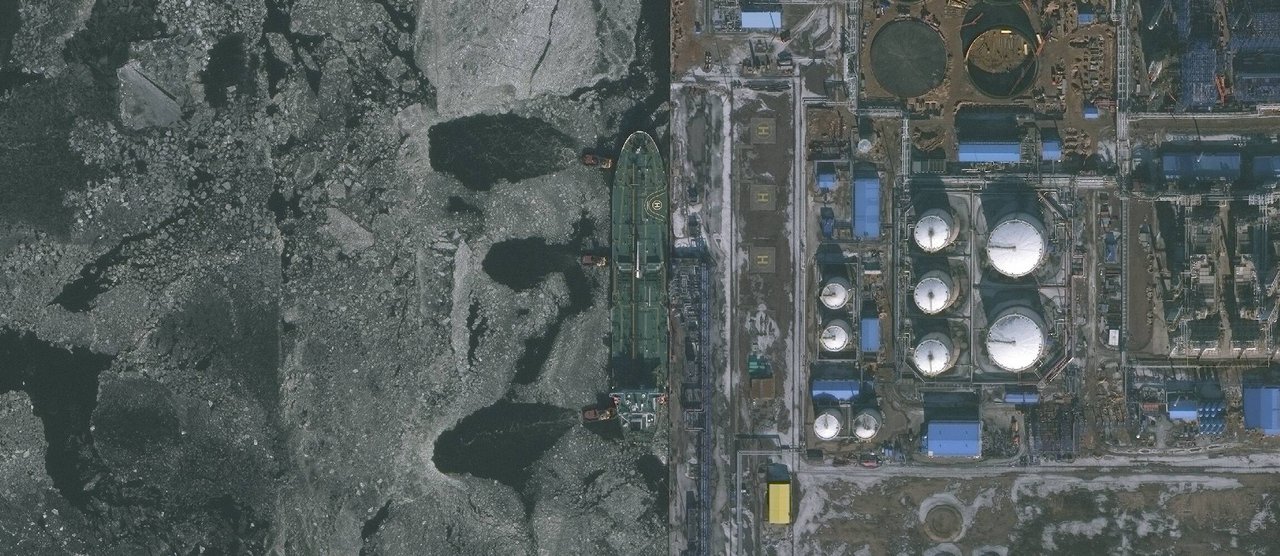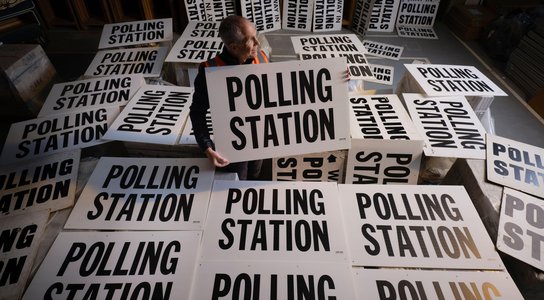
An oil tanker chartered by Shell docks at the Russian port of Ust-Luga on 14 March 2022. Satellite imagery © 2022 Maxar Technologies.
The data, shared with consultants seconded to the oil major and subsequently posted online by hackers, reveals for the first time the enormous sums involved in Shell’s annual trade with Russia and provides an unprecedented glimpse into the inner workings of the company’s financially secretive trading arm. Today the company posted adjusted earnings for the first quarter of the year of $9.1 billion, up from $3.2 billion in 2021 and $2.9 billion during the same period in 2020.
The news comes as dissent by Hungary and Slovakia threatens to undermine new European Commission sanctions proposal aimed in part at cutting through long-term contracts between Russian oil producers and major buyers in Europe. Shell revealed last week that it has supply agreements in place that run into 2023, longer than any other major oil company or commodity trader that has yet gone on the record, though will exit these contracts if EU sanctions require it.
Responding to an analysis of the 2020 data, a Shell spokesperson said that most oil supply contracts signed before Russia’s invasion of Ukraine would expire by the end of 2022, but that “two contracts with a small, independent Russian producer” will continue, declining to name the company.
As markets await the outcome of diplomatic wrangling over the EU’s oil sanctions package, the statement leaves Shell more exposed than competitor TotalEnergies and commodity traders Vitol and Trafigura, which have all pledged to stop buying Russian crude this year. Payments to the private firm Surgutneftegaz appear to fall outside existing EU sanctions on Russian state-owned enterprises, which will restrict purchases from Rosneft and Gazprom Neft as of May 15.
Responding on Wednesday to the announcement of the new sanctions proposal, which consists primarily of a ban on dealings between European companies and Russian producers phased in over six months, a Shell spokesperson welcomed the “clear direction” provided by the European Commission and said it was confident it could meet the proposed deadline. But the spokesperson cautioned that “the measures would increase the current volatility in the energy market which would be a challenge for governments, energy suppliers and consumers.”
Tightening trading terms
Europe’s largest oil and gas company has also faced criticism in recent weeks for buying blended oil products, potentially obscuring their partly Russian origin. In an interview with the Observer last Sunday, Oleg Ustenko – president Volodomyr Zelenskyy’s chief economic adviser – promised
that the Ukrainian government would retrospectively “prosecute and sue”
companies engaged in the Russian oil trade when the conflict is over,
having written
to Shell last week saying that it was “hard to comprehend [the
company’s] continued trade in Russian fossil fuels” and calling its
purchases of blended products an “accounting trick”.
It is hard to comprehend Shell’s continued trade in Russian fossil fuels - Oleg Ustenko, adviser to Volodomyr Zelenskyy
Shell told Global Witness it had “eliminated the vast majority of spot purchases of refined products that may contain a proportion of Russian fuel that was blended in further up the supply chain” and that such products would not in any case have been sold on as ‘non-Russian’. On Wednesday, after placing a public bid for jet fuel with new contract terms banning any products blended with Russian fuel, the company acknowledged that it had “taken a further step to tighten [its] trading terms”.
Global Witness has been working with the Russian Tanker Tracking Group – a group of Ukrainian government representatives, academics and technical experts, including Mr. Ustenko – to track fossil fuel shipments from Russian ports. There is no suggestion that Shell’s ongoing purchases of Russian crude oil and products are in any way illegal or in violation of international sanctions.
Hard bargains
The identity of the Russian companies with which Shell has ongoing contracts remains unclear. On 13–14 March, according to data from Refinitiv Eikon and MarineTraffic, a tanker chartered by Shell Trading picked up more than 700,000 barrels of Urals crude from the Baltic port of Ust-Luga via a loading slot assigned to Surgutneftegaz (a.k.a. Surgut). On 17–18 April, another shipment of more than a million barrels was picked up from Novorossiysk by a Shell-chartered ship, this time via a slot for Siberian Light crude preliminarily assigned to Lukoil.
Shell paid around $600 million to Surgut for Russian crude in 2020, more than to any other single company, according to the leaked data. The independent producer’s shares trade at a steep discount due to longstanding investor concerns over the company’s corporate governance, opaque ownership structure and unusually large cash reserves, which analysts have suggested could be raided by the Russian government, a suggestion the company has strongly denied.
Surgut has a reputation for driving a hard bargain in contracts, which are reportedly negotiated personally by the firm’s senior management in Siberia. In 2018 negotiations, according to unnamed commodity traders speaking to Reuters, the company demanded that buyers take on responsibility for any losses that might arise from sanctions: “They basically said – sanctions don’t matter. Buyers have to find a way to pay, or to return purchased goods, or pay penalties.”
Russia’s fourth-largest oil producer usually sells cargoes via public tender, but has failed to place them in recent weeks and is believed to be making private deals instead, as well as changing its contract terms
to grease the wheels of exports to China. There is no suggestion that
Shell’s historic payments to Surgut were in any way improper.


